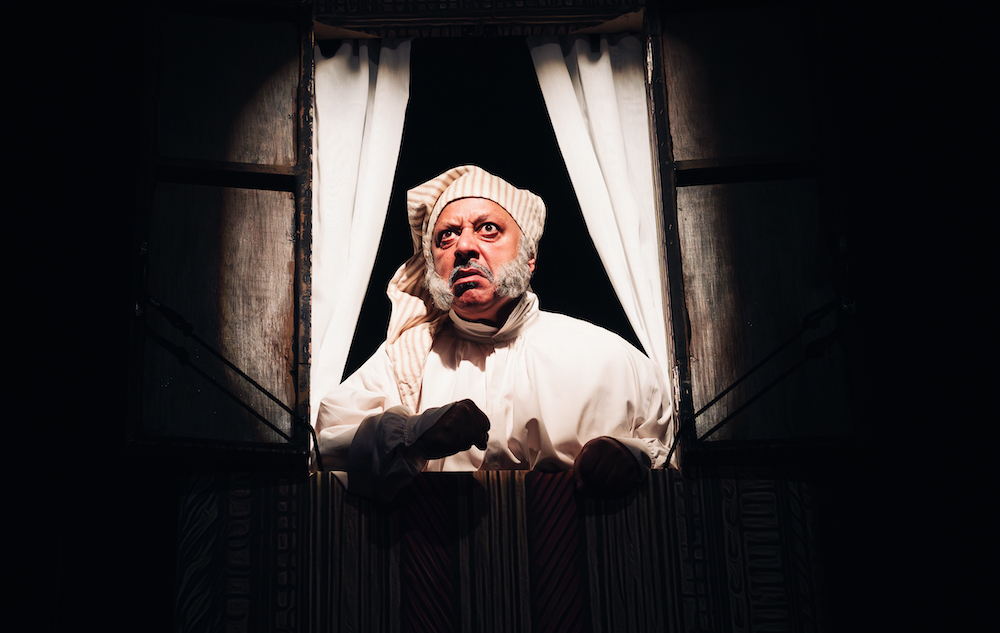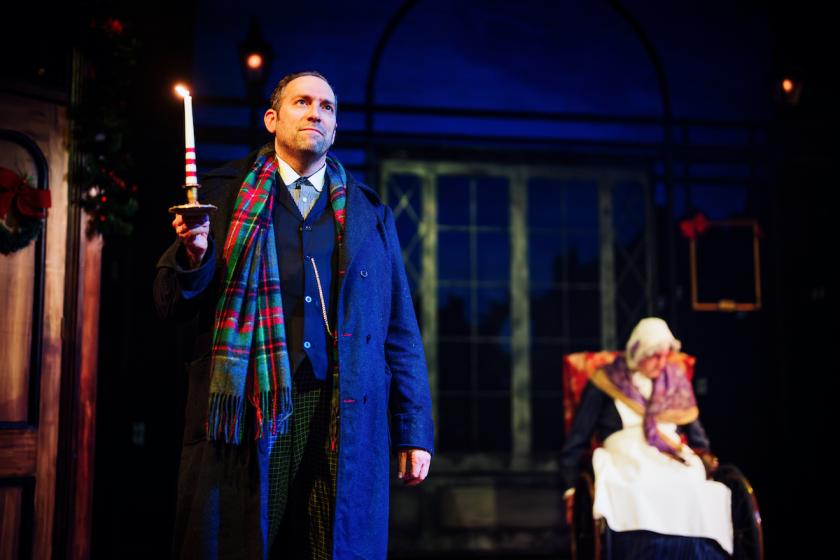It’s an elementary fact that Dickens sells at this time of year — look at all the perennial Christmas Carols sprouting up everywhere. But if grumpy old Scrouge is an instantly recognizable literary icon then so is the super sleuth Sherlock Holmes. Bringing them both together has been the inspired idea of actor, director and playwright Mark Shanahan, whose A Sherlock Carol, which first opened at this venue and on Off-Broadway last year, now returns to Marylebone Theatre, which is located just around the corner from Baker Street, where number 221B has been the residence of Arthur Conan Doyle’s detective since the first Holmes story was published in 1887.
A Sherlock Carol is an intelligent mash-up of A Christmas Carol and The Adventure of the Blue Carbuncle, a Holmes mystery story set at Yuletide, with passing mentions of other Holmes adventures, from The Final Problem to A Scandal in Bohemia. The story takes place three years after Holmes survived his deadly battle with Professor Moriarty, “the Napoleon of Crime” at the Reichenbach Falls. But this is a pyrrhic victory: without his superhuman adversary, Holmes is depressed, rejecting his friend Doctor Watson (now happily married to Mary Morstan) and haunted by the ghost of Moriarty. As Christmas approaches, he is visited by Dickens’s Tiny Tim, now the adult Dr Cratchit, who comes with a classic request.  Cratchit, who still has a disability but has survived a materially impoverished childhood thanks to the benevolence of the repentant Scrouge, asks Holmes to investigate his benefactor’s suspicious death. While other familiar characters appear, including Inspector Lestrade of Scotland Yard, American diva Irene Adler and Baker Street Irregular Wiggins’s daughter Emma, Holmes must first work through his debilitating mental collapse. To facilitate this he is visited by the ghost of Scrouge, who shows him (yes, you’ve guessed it) scenarios from past, present and future to provoke him into becoming, in the words of our world, his best possible self.
Cratchit, who still has a disability but has survived a materially impoverished childhood thanks to the benevolence of the repentant Scrouge, asks Holmes to investigate his benefactor’s suspicious death. While other familiar characters appear, including Inspector Lestrade of Scotland Yard, American diva Irene Adler and Baker Street Irregular Wiggins’s daughter Emma, Holmes must first work through his debilitating mental collapse. To facilitate this he is visited by the ghost of Scrouge, who shows him (yes, you’ve guessed it) scenarios from past, present and future to provoke him into becoming, in the words of our world, his best possible self.
This lighthearted seasonal entertainment makes amusing references to its sources: with the cast starting the show with a Dickens-flavoured riff on Holmes: “Moriarty was dead, to begin with…” and the consulting detective’s attitude to Christmas is, of course, “Bah!”. And although it has a plot about a murder mystery this is less important than the creation of a generally merry atmosphere, with carols, candles and some genial festive trimmings. The combination of Dickens and Conan Doyle works well, with expected episodes — the visit of a ghost to a materialistic man, the goose story and the blue carbuncle, as well as jokes at the expense of the cops — never outstaying their welcome.
Amid the amusing silliness and ghostly magic some more serious content quietly creeps in. Since A Christmas Carol is deeply concerned with redemption it’s not surprising that Holmes makes the psychological journey from crumpled inaction to a renewed sense of life, symbolized by accepting an invitation to celebrate the season with his oldest friend. While this is predictable, it also has a charm, a warmth, a feeling of personal justice being done. Likewise the sense of forgiveness at this time year, which features in the show’s Conan Doyle source material, comes across strongly. At the end of the play, the cast also remind us about the condition of rough sleepers in today’s London.
This kind of entertainment, part tribute, part spoof, is best enjoyed with a belly full of mince pies and mulled wine, a condition of warmed cockles which helps you overlook some of the play’s shortcomings. For while Shanahan’s text is clever and clear, and brings out the essential humanity of both Dickens and Conan Doyle, it is also a bit repetitive. The murder mystery plot is not intriguing enough and some of the jokes are more than a bit flat. Lots of passages are simply dull. I know that this is contrary to the charitable vibe of the piece but I can’t help thinking that instead of directing the play himself, Shanahan might have benefitted from having another directorial eye on the show.
As it is, Shanahan’s production, with a lovely design by Anna Louizos, is both evocative of a foggy Victorian London and often panto-style in its overall effect. In a tribute to its sources, the acting is often melodramatic and sentimental, although Ben Caplan in the central role of Holmes makes a convincing journey from haunted despair to rejuvenated life. He is well supported by Kammy Darweish’s Scrouge (pictured above), and Richard James (Watson), Devesh Kishore (Cratchit), Rosie Armstrong (Irene) and Jessica Hern (Emma). These last four also play other bit-parts in a show whose confident theatricality is often a joy to watch, even if you can imagine it having more mirth and sparkle.















Add comment